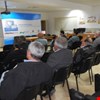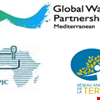


A training workshop was organized in Tunis, in the framework of the Water, Climate, Development Program for Africa (WACDEP), on 20-23 October; the second one out of a series of five training workshops composing the capacity building program “The Economics of Adaptation, Water Security and Climate Resilient Development”. This series of workshops follows the Framework cycle developed under WACDEP for water security and climate resilience.

A press event was held at the Athalassa Center for Environmental Education on December 2nd, 2014 to mark the conclusion of the first phase of implementation works for the installation of new and the reinstatement of existing greywater reuse and rainwater harvesting systems at public schools and centres of environmental education.

A training will be held by the Global Water Partnership - Mediterranean (GWP-Med), in partnership with the African Center for Training of Journalists and Communicators (CAPJC), and the Association Children of the Earth Network (ARET), on December, 23-24, 2014, in Tunis, Tunisia.

The Office of the Prime Minster of Kosovo in cooperation with Global Water Partnership organized a National Drought Dialogue on 12 November 2014 in Pristina.

The Office of the Prime Minster of Kosovo in cooperation with Global Water Partnership organized a National Drought Dialogue on 12 November 2014 in Pristina.

The first consultation workshop of the Water Policy Dialogue in Palestine, within the Union for the Mediterranean (UfM) labelled project Governance & Financing for the Mediterranean Water Sector was held in close cooperation with the Palestinian Water Authority (PWA), on 13 November 2014, in Ramallah. With more than 40 key stakeholders from the government; private companies and banks; research institutes and Academia; media as well as the Civil Society actively participating, the workshop marked the official launch of the Policy Dialogue to be conducted by GWP-Med within the period 2014-2015.


On 19 November 2014 in Seoul (Korea), GWP CACENA Regional Coordinator Vadim Sokolov took part in the 16th Governing Council meeting of Asia-Pacific Water Forum (APWF) and the 2nd meeting for preparing the 7th World Water Forum.
The Roundtable "Role of Mass media and Public in Water Saving Promotion" under initiative by SIC ICWC was held by the Ecological Movement of Uzbekistan jointly with the Embassy of Israel in the Republic of Uzbekistan on 13 November 2013 in the La Grande Plaza Hotel in Tashkent.
Call for Quotations for the Supply and Installation of a Green Roof at the Institute of Applied Science (IAS), of the College of Arts, Science & Technology (MCAST), Malta within the framework of the "Climate Change Adaptation through Non-Conventional Water Resources Management in North Mediterranean" (a.k.a. Alter Aqua).